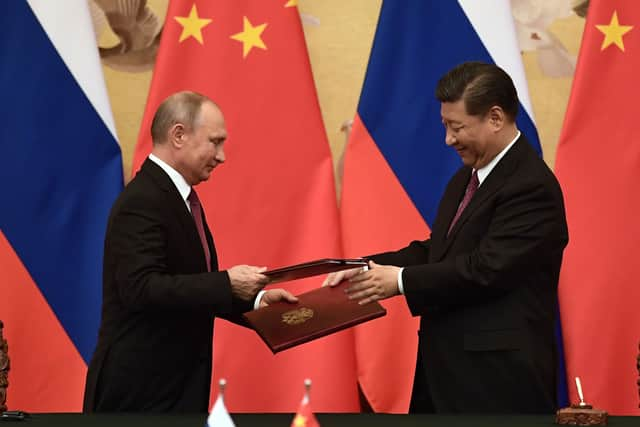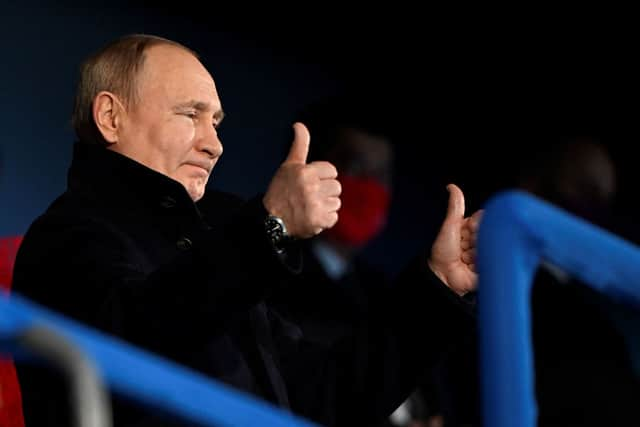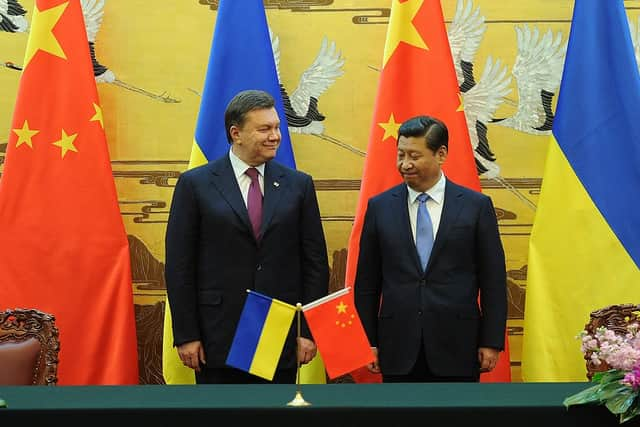Is China an ally of Russia? Relationship to Ukraine, who does it support in conflict - and Taiwan explained
This article contains affiliate links. We may earn a small commission on items purchased through this article, but that does not affect our editorial judgement.
and live on Freeview channel 276
The widespread condemnation from the international community in response to Vladimir Putin’s aggressive and illegal invasion of Ukraine has been hard to ignore.
Nations large and small have weighed in, speaking out against events, laying out sanctions and offering support to Ukraine as it faces the Russian oppressor.
Advertisement
Hide AdAdvertisement
Hide AdBut one major power that’s been conspicuously quiet is China. Why is that?
Is China allied to Russia? Why hasn’t it made the easy move of condemning Putin’s movements?
Here is everything you need to know about it.
What has China said about the conflict?
On 25 February, the UK Government was pressed to give an update on China’s position on Ukraine as the Commons began a sitting.
Conservative MP Sir Bernard Jenkin said: “I wonder if the Government has given any indication about whether they are going to make a statement about our relations with China, given that China has done nothing to condemn the Ukrainian incursion?”
Advertisement
Hide AdAdvertisement
Hide AdIndeed, China has stopped short of outright condemning President Putin’s aggressive decisions, and has refused to acknowledge them as an “invasion”.
At a daily news briefing, government spokesman Wang Wenbin said that while China respected the territorial integrity of all countries, it also understood “Russia’s legitimate concerns on security issues”.
Wenbin said China still recognised Ukraine as a legitimate state, and expressed hope that a political solution to the conflict could still be found, but failed to give suggestions on how this might come about.


He also did not say whether or not Beijing would recognise the self-declared breakaway republics of Donetsk and Luhansk in the east of Ukraine.
Advertisement
Hide AdAdvertisement
Hide AdOn the same day, Chinese state TV reported that China’s President Xi Jinping told Vladimir Putin in a phone call that China supports Russia in efforts to resolve the Ukraine crisis via dialogue.
Is China an ally to Russia?
Whether China can be considered a fully fledged ally to Russia is up for debate, and the two country’s relationship is often described as a “strategic partnership”.
In 2001, they signed the Treaty of Good-Neighbourliness and Friendly Cooperation, a 20-year pact which was recently renewed for five more years; it is currently set to run until at least 2026.
The treaty outlines the basis for peaceful relations and economic cooperation, as well as diplomatic and geopolitical reliance.
Advertisement
Hide AdAdvertisement
Hide AdControversially, one of the document’s articles can be interpreted as an implicit defence pact, with others hinting at increased military cooperation, including the sharing of “military know-how” and Chinese access to Russian military technology.
The document also affirms Russia’s stand on Taiwan as “an inalienable part of China”, which is arguably the most worrying element.
It is thought that China could take Russia’s lead in the future and invade Taiwan, for similar reasons to Putin’s want of Ukraine.
A commitment to ensure the “national unity and territorial integrity” in the two countries means that a Sino-Russian alliance would be quite a formidable force.


Who are the ‘bad guys’ in China’s eyes?
Advertisement
Hide AdAdvertisement
Hide AdAnti-West ideologies continue to grow in China, a country whose social media and press are highly censored and controlled by the state.
Some state media outlets covering the crisis have portrayed it an example of the West's failures, with the US-led Nato refusing to respect the sovereign right of countries to defend their territory.
The Global Times newspaper even claimed it was "the ever closer relationship and bond between China and Russia [that is] the last defence that protects the world order".
A report by state news agency Xinhua also said the US was attempting to "divert domestic attention" and "revive its influence over Europe".
What is China’s relationship with Ukraine?
Advertisement
Hide AdAdvertisement
Hide AdBut while China could be considered an ally with Russia, it also has close ties with Ukraine, and so its position on the conflict is made all the more complicated.
Currently China is Ukraine's largest trading partner, with Chinese investments in the country rising from $50 million (£37 million) to $260 million (£194 million) between 2016 and 2021.
In return, Ukraine is the largest exporter of corn to China, and has begun supplying China with modern jet engines for military craft.
Backing Russia in the conflict would undoubtedly see it lose out on these trade links, as well put strain on the hundreds of other deals and links it has with countries around the world.


Advertisement
Hide AdAdvertisement
Hide AdBut to denounce Russia’s plans could be just as costly, and would risk it losing out on support from its most powerful neighbour.
All things considered, and from an economic and political standpoint, China’s on-the-fence approach is almost understandable.
Why is Taiwan important?
The Treaty of Good-Neighbourliness and Friendly Cooperation also affirms Russia’s stand on Taiwan as “an inalienable part of China”, which is arguably the most worrying element.
The self-governing island of Taiwan is a territory which China believes should be fully reintegrated into the People’s Republic. Sound familiar? It has strong echoes of the Crimea Problem.
Advertisement
Hide AdAdvertisement
Hide AdEvents in Ukraine have renewed focus on Taiwan, with nationalists in China calling for their country to take encouragement from Russia and act now on social media.
Could China take Russia’s lead in the future and invade Taiwan, for similar reasons to Putin’s want of Ukraine?
But the Ukrainian conflict could have effects in the other direction too.
“If Chinese citizens start joining the dots with Russia's justification for invading Ukraine and applying it to their own country,” says the BBC’s China Correspondent, Stephen McDonell, “this could upend the Chinese government's entire explanation for its current borders.”
Advertisement
Hide AdAdvertisement
Hide Ad“Putin says he's liberating Russian speakers inside Ukraine. What of the ethnic Mongolians, Koreans, Kyrgyz and the like who are now part of China?
“More potentially explosive for Beijing, what if Tibetans or Uyghurs renew calls for greater autonomy or even independence?”
A message from the editor:
Thank you for reading. NationalWorld is a new national news brand, produced by a team of journalists, editors, video producers and designers who live and work across the UK. Find out more about who’s who in the team, and our editorial values. We want to start a community among our readers, so please follow us on Facebook, Twitter and Instagram, and keep the conversation going. You can also sign up to our newsletters and get a curated selection of our best reads to your inbox every day.
Comment Guidelines
National World encourages reader discussion on our stories. User feedback, insights and back-and-forth exchanges add a rich layer of context to reporting. Please review our Community Guidelines before commenting.
